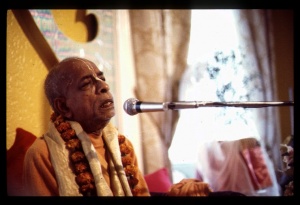CC Adi 17.276 (1975): Difference between revisions
(Vanibot #0027: CCMirror - Mirror CC's 1996 edition to form a basis for 1975) |
(Vanibot #0020: VersionCompareLinker - added a link to the Version Compare feature) |
||
| Line 2: | Line 2: | ||
<div style="float:left">'''[[Sri Caitanya-caritamrta (1975)|Śrī Caitanya-caritāmṛta (1975)]] - [[CC Adi (1975)|Ādi-līlā]] - [[CC Adi 17 (1975)|Chapter 17: The Pastimes of Lord Caitanya Mahāprabhu in His Youth]]'''</div> | <div style="float:left">'''[[Sri Caitanya-caritamrta (1975)|Śrī Caitanya-caritāmṛta (1975)]] - [[CC Adi (1975)|Ādi-līlā]] - [[CC Adi 17 (1975)|Chapter 17: The Pastimes of Lord Caitanya Mahāprabhu in His Youth]]'''</div> | ||
<div style="float:right">[[File:Go-previous.png|link=CC Adi 17.275 (1975)|Ādi-līlā 17.275]] '''[[CC Adi 17.275 (1975)|Ādi-līlā 17.275]] - [[CC Adi 17.277 (1975)|Ādi-līlā 17.277]]''' [[File:Go-next.png|link=CC Adi 17.277 (1975)|Ādi-līlā 17.277]]</div> | <div style="float:right">[[File:Go-previous.png|link=CC Adi 17.275 (1975)|Ādi-līlā 17.275]] '''[[CC Adi 17.275 (1975)|Ādi-līlā 17.275]] - [[CC Adi 17.277 (1975)|Ādi-līlā 17.277]]''' [[File:Go-next.png|link=CC Adi 17.277 (1975)|Ādi-līlā 17.277]]</div> | ||
{{CompareVersions|CC|Adi 17.276|CC 1975|CC 1996}} | |||
{{RandomImage}} | {{RandomImage}} | ||
==== TEXT 276 ==== | ==== TEXT 276 ==== | ||
| Line 25: | Line 24: | ||
<div class="translation"> | <div class="translation"> | ||
To taste the mellows of Śrīmatī | To taste the mellows of Śrīmatī Rādhārāṇī's loving affairs in Her relationship with Kṛṣṇa, and to understand the reservoir of pleasure in Kṛṣṇa, Kṛṣṇa Himself, as Śrī Caitanya Mahāprabhu, accepted the mood of Rādhārāṇī. | ||
</div> | </div> | ||
| Line 32: | Line 31: | ||
<div class="purport"> | <div class="purport"> | ||
In this connection Śrīla Bhaktisiddhānta Sarasvatī Ṭhākura writes in his Anubhāṣya, | In this connection Śrīla Bhaktisiddhānta Sarasvatī Ṭhākura writes in his Anubhāṣya, "Śrī Gaurasundara is Kṛṣṇa Himself with the attitude of Śrīmatī Rādhārāṇī. Śrī Caitanya Mahāprabhu never gave up the attitude of the gopīs. He remained everlastingly predominated by Kṛṣṇa and never accepted the part of the predominator by imitating conjugal love with an ordinary woman, as sahajiyās generally do. He never placed Himself in the position of a debauchee. Lusty materialists like the members of the sahajiyā-sampradāya hanker after women, even others' wives. But when they try to ascribe the responsibility for their lusty activities to Śrī Caitanya Mahāprabhu, they become offenders to Svarūpa Dāmodara and Śrīla Vṛndāvana dāsa Ṭhākura. In Śrī Caitanya-bhāgavata, Ādi-khaṇḍa, Chapter Fifteen, it is said: | ||
:sabe para-strīra prati nāhi parihāsa | :sabe para-strīra prati nāhi parihāsa | ||
:strī | :strī dekhi' dūre prabhu hayena eka-pāśa | ||
'Śrī Caitanya Mahāprabhu never even joked with others' wives. As soon as He saw a woman coming, He would immediately give her ample room to pass without talking.' He was extremely strict regarding the association of women. The sahajiyās, however, pose as followers of Śrī Caitanya Mahāprabhu although they indulge in lusty affairs with women. In His youth Lord Caitanya was very humorous with everyone, but He never joked with any woman, nor in this incarnation did He talk about women. The gaurāṅga-nāgarī party is not approved by Śrī Caitanya Mahāprabhu or Vṛndāvana dāsa Ṭhākura. Even though one may offer all kinds of prayers to Caitanya Mahāprabhu, one should strictly avoid worshiping Him as the Gaurāṅga Nāgara. The personal behavior of Śrī Caitanya Mahāprabhu and the verses written by Śrī Vṛndāvana dāsa Ṭhākura have completely repudiated the lusty desires of the gaurāṅga-nāgarīs." | |||
</div> | </div> | ||
Latest revision as of 16:27, 26 January 2020

A.C. Bhaktivedanta Swami Prabhupada
TEXT 276
- sva-mādhurya rādhā-prema-rasa āsvādite
- rādhā-bhāva aṅgī kariyāche bhāla-mate
SYNONYMS
sva-mādhurya—His own conjugal love; rādhā-prema-rasa—the mellow of the loving affairs between Rādhārāṇī and Kṛṣṇa; āsvādite—to taste; rādhā-bhāva—the mood of Śrīmatī Rādhārāṇī; aṅgī kariyāche—He accepted; bhāla-mate—very well.
TRANSLATION
To taste the mellows of Śrīmatī Rādhārāṇī's loving affairs in Her relationship with Kṛṣṇa, and to understand the reservoir of pleasure in Kṛṣṇa, Kṛṣṇa Himself, as Śrī Caitanya Mahāprabhu, accepted the mood of Rādhārāṇī.
PURPORT
In this connection Śrīla Bhaktisiddhānta Sarasvatī Ṭhākura writes in his Anubhāṣya, "Śrī Gaurasundara is Kṛṣṇa Himself with the attitude of Śrīmatī Rādhārāṇī. Śrī Caitanya Mahāprabhu never gave up the attitude of the gopīs. He remained everlastingly predominated by Kṛṣṇa and never accepted the part of the predominator by imitating conjugal love with an ordinary woman, as sahajiyās generally do. He never placed Himself in the position of a debauchee. Lusty materialists like the members of the sahajiyā-sampradāya hanker after women, even others' wives. But when they try to ascribe the responsibility for their lusty activities to Śrī Caitanya Mahāprabhu, they become offenders to Svarūpa Dāmodara and Śrīla Vṛndāvana dāsa Ṭhākura. In Śrī Caitanya-bhāgavata, Ādi-khaṇḍa, Chapter Fifteen, it is said:
- sabe para-strīra prati nāhi parihāsa
- strī dekhi' dūre prabhu hayena eka-pāśa
'Śrī Caitanya Mahāprabhu never even joked with others' wives. As soon as He saw a woman coming, He would immediately give her ample room to pass without talking.' He was extremely strict regarding the association of women. The sahajiyās, however, pose as followers of Śrī Caitanya Mahāprabhu although they indulge in lusty affairs with women. In His youth Lord Caitanya was very humorous with everyone, but He never joked with any woman, nor in this incarnation did He talk about women. The gaurāṅga-nāgarī party is not approved by Śrī Caitanya Mahāprabhu or Vṛndāvana dāsa Ṭhākura. Even though one may offer all kinds of prayers to Caitanya Mahāprabhu, one should strictly avoid worshiping Him as the Gaurāṅga Nāgara. The personal behavior of Śrī Caitanya Mahāprabhu and the verses written by Śrī Vṛndāvana dāsa Ṭhākura have completely repudiated the lusty desires of the gaurāṅga-nāgarīs."